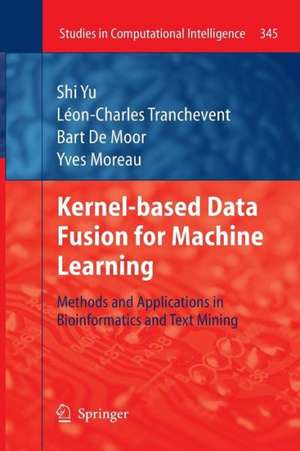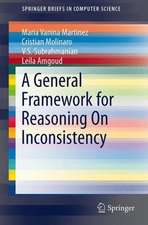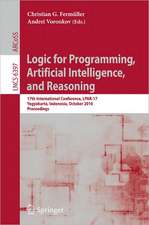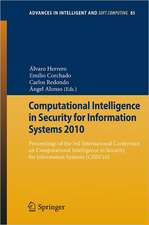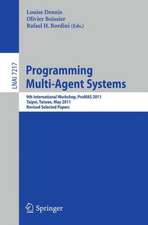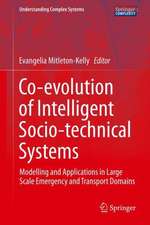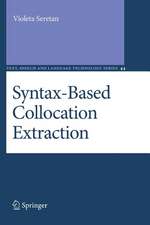Kernel-based Data Fusion for Machine Learning: Methods and Applications in Bioinformatics and Text Mining: Studies in Computational Intelligence, cartea 345
Autor Shi Yu, Léon-Charles Tranchevent, Bart Moor, Yves Moreauen Limba Engleză Paperback – 21 apr 2013
The topics presented in this book are meant for researchers or students who use support vector machines. Several topics addressed in the book may also be interesting to computational biologists who want to tackle data fusion challenges in real applications. The background required of the reader is a good knowledge of data mining, machine learning and linear algebra.
| Toate formatele și edițiile | Preț | Express |
|---|---|---|
| Paperback (1) | 1154.48 lei 6-8 săpt. | |
| Springer Berlin, Heidelberg – 21 apr 2013 | 1154.48 lei 6-8 săpt. | |
| Hardback (1) | 1159.10 lei 6-8 săpt. | |
| Springer Berlin, Heidelberg – 26 mar 2011 | 1159.10 lei 6-8 săpt. |
Din seria Studies in Computational Intelligence
- 20%
 Preț: 449.37 lei
Preț: 449.37 lei - 20%
 Preț: 1158.26 lei
Preț: 1158.26 lei - 20%
 Preț: 986.66 lei
Preț: 986.66 lei - 20%
 Preț: 1452.76 lei
Preț: 1452.76 lei - 20%
 Preț: 168.78 lei
Preț: 168.78 lei - 20%
 Preț: 1291.10 lei
Preț: 1291.10 lei - 18%
 Preț: 1112.30 lei
Preț: 1112.30 lei - 20%
 Preț: 565.39 lei
Preț: 565.39 lei - 20%
 Preț: 649.28 lei
Preț: 649.28 lei - 20%
 Preț: 1047.73 lei
Preț: 1047.73 lei - 20%
 Preț: 1578.96 lei
Preț: 1578.96 lei - 20%
 Preț: 643.50 lei
Preț: 643.50 lei - 20%
 Preț: 657.49 lei
Preț: 657.49 lei - 20%
 Preț: 993.28 lei
Preț: 993.28 lei - 20%
 Preț: 990.80 lei
Preț: 990.80 lei - 20%
 Preț: 989.96 lei
Preț: 989.96 lei - 20%
 Preț: 1165.69 lei
Preț: 1165.69 lei - 20%
 Preț: 1444.52 lei
Preț: 1444.52 lei - 20%
 Preț: 1041.96 lei
Preț: 1041.96 lei - 20%
 Preț: 1047.73 lei
Preț: 1047.73 lei - 20%
 Preț: 1046.06 lei
Preț: 1046.06 lei - 18%
 Preț: 2500.50 lei
Preț: 2500.50 lei - 20%
 Preț: 989.13 lei
Preț: 989.13 lei - 20%
 Preț: 1165.69 lei
Preț: 1165.69 lei - 20%
 Preț: 1164.05 lei
Preț: 1164.05 lei - 20%
 Preț: 1042.79 lei
Preț: 1042.79 lei - 20%
 Preț: 1460.19 lei
Preț: 1460.19 lei - 18%
 Preț: 1403.52 lei
Preț: 1403.52 lei - 18%
 Preț: 1124.92 lei
Preț: 1124.92 lei - 20%
 Preț: 1039.47 lei
Preț: 1039.47 lei - 20%
 Preț: 1008.11 lei
Preț: 1008.11 lei - 20%
 Preț: 1045.25 lei
Preț: 1045.25 lei - 20%
 Preț: 1275.42 lei
Preț: 1275.42 lei - 20%
 Preț: 1040.32 lei
Preț: 1040.32 lei - 20%
 Preț: 988.32 lei
Preț: 988.32 lei - 20%
 Preț: 1169.79 lei
Preț: 1169.79 lei - 20%
 Preț: 1162.37 lei
Preț: 1162.37 lei - 20%
 Preț: 1059.26 lei
Preț: 1059.26 lei - 20%
 Preț: 1164.05 lei
Preț: 1164.05 lei - 20%
 Preț: 1166.52 lei
Preț: 1166.52 lei - 20%
 Preț: 1459.38 lei
Preț: 1459.38 lei - 18%
 Preț: 1005.74 lei
Preț: 1005.74 lei - 20%
 Preț: 997.38 lei
Preț: 997.38 lei - 20%
 Preț: 1055.94 lei
Preț: 1055.94 lei - 20%
 Preț: 1284.47 lei
Preț: 1284.47 lei - 20%
 Preț: 994.08 lei
Preț: 994.08 lei - 20%
 Preț: 1048.72 lei
Preț: 1048.72 lei - 20%
 Preț: 1066.02 lei
Preț: 1066.02 lei - 20%
 Preț: 943.78 lei
Preț: 943.78 lei - 20%
 Preț: 1173.10 lei
Preț: 1173.10 lei
Preț: 1154.48 lei
Preț vechi: 1443.10 lei
-20% Nou
Puncte Express: 1732
Preț estimativ în valută:
220.92€ • 236.23$ • 184.19£
220.92€ • 236.23$ • 184.19£
Carte tipărită la comandă
Livrare economică 17 aprilie-01 mai
Preluare comenzi: 021 569.72.76
Specificații
ISBN-13: 9783642267512
ISBN-10: 3642267513
Pagini: 228
Ilustrații: XIV, 214 p.
Dimensiuni: 155 x 235 x 12 mm
Greutate: 0.33 kg
Ediția:2011
Editura: Springer Berlin, Heidelberg
Colecția Springer
Seria Studies in Computational Intelligence
Locul publicării:Berlin, Heidelberg, Germany
ISBN-10: 3642267513
Pagini: 228
Ilustrații: XIV, 214 p.
Dimensiuni: 155 x 235 x 12 mm
Greutate: 0.33 kg
Ediția:2011
Editura: Springer Berlin, Heidelberg
Colecția Springer
Seria Studies in Computational Intelligence
Locul publicării:Berlin, Heidelberg, Germany
Public țintă
ResearchCuprins
Introduction.- Rayleigh quotient-type problems in machine learning.- Ln-norm Multiple Kernel Learning and Least Squares Support VectorMachines.- Optimized data fusion for kernel k-means Clustering.- Multi-view text mining for disease gene prioritization and clustering.- Optimized data fusion for k-means Laplacian Clustering.- Weighted Multiple Kernel Canonical Correlation.- Cross-species candidate gene prioritization with MerKator.- Conclusion.
Recenzii
From the reviews:
“The book provides an introduction to data fusion problems using support vector machines (SVMs). … The book is meant for researchers, scientists and engineers using SVMs, or other statistical learning methods, but it also may be used as a reference material for graduate courses in machine learning and data mining.” (Florin Gorunescu, Zentralblatt MATH, Vol. 1227, 2012)
“The book provides an introduction to data fusion problems using support vector machines (SVMs). … The book is meant for researchers, scientists and engineers using SVMs, or other statistical learning methods, but it also may be used as a reference material for graduate courses in machine learning and data mining.” (Florin Gorunescu, Zentralblatt MATH, Vol. 1227, 2012)
Textul de pe ultima copertă
Data fusion problems arise frequently in many different fields. This book provides a specific introduction to data fusion problems using support vector machines. In the first part, this book begins with a brief survey of additive models and Rayleigh quotient objectives in machine learning, and then introduces kernel fusion as the additive expansion of support vector machines in the dual problem. The second part presents several novel kernel fusion algorithms and some real applications in supervised and unsupervised learning. The last part of the book substantiates the value of the proposed theories and algorithms in MerKator, an open software to identify disease relevant genes based on the integration of heterogeneous genomic data sources in multiple species.
The topics presented in this book are meant for researchers or students who use support vector machines. Several topics addressed in the book may also be interesting to computational biologists who want to tackle data fusion challenges in real applications. The background required of the reader is a good knowledge of data mining, machine learning and linear algebra.
The topics presented in this book are meant for researchers or students who use support vector machines. Several topics addressed in the book may also be interesting to computational biologists who want to tackle data fusion challenges in real applications. The background required of the reader is a good knowledge of data mining, machine learning and linear algebra.
Caracteristici
Recent research on Kernel-based Data Fusion for Machine Learning Presents methods and applications in bioinformatics and text mining Written by leading experts in the field
